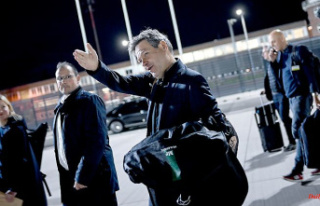Chancellor Scholz is more clearly on the side of the demonstrators in Iran than before. As early as next week, further EU sanctions should increase the pressure on the regime, he explains in his video podcast. The chancellor resolutely rejects a threat from Tehran.
Chancellor Olaf Scholz calls for EU sanctions against the leadership in Iran because of the violent crackdown on demonstrators. "We want to further increase the pressure on the Revolutionary Guards and the political leadership," said Scholz in his video podcast "Kanzler compact". "Further sanctions are to be added next week. We support the collection of evidence so that the perpetrators can be held accountable," added the Chancellor. The federal government is also pushing for a special session of the UN Human Rights Council. "It's always about solving the crimes of the Iranian regime." The government alone is responsible for the "explosion of violence" in Iran.
Scholz thus sided more clearly than before with the demonstrators in Iran, who are protesting against repression and violence by the Islamic system of rule. Taking off headscarves, for example, has become a symbol. He demanded an immediate end to the violence and the release of political prisoners and imprisoned journalists. "But I say to the demonstrators and the citizens with Iranian roots here: We stand for everything you demand - for human rights and women's rights. We stand with the Iranian people," emphasized the SPD politician .
The chancellor also rejected a threat from the Iranian foreign minister that Germany would face consequences for its position. Anyone who shoots at their own population must expect resistance from Germany, said Scholz.
The nationwide protests in Iran were sparked by the death of 22-year-old Mahsa Amini. The Kurd died in police custody on September 16. The so-called morality police had arrested her because she is said to have violated Islamic dress codes. So far, more than 300 people are said to have been killed in the protests.












